Testosterone Induced Wistar Rat Model for Gut Microbiota Dysbiosis of Polycystic Ovarian Syndrome Research
Abstract
Introduction: Gut microbiota modification based on dysbiosis of gut microbiota dysbiosis (DOGMA) theory may provide a new therapy approach in polycystic ovarian syndrome (PCOS). Research of this new therapy needs a suitable animal model thus this study was aimed to investigate whether Wistar rats that were injected by testosterone propionate (TP) could induce both PCOS and gut microbiota dysbiosis condition.
Methods: Design of this study was post-test only control group design randomized control trial. Wistar rats were divided into two groups: control and TP. Blood, faecal and ovarian tissue sampling also vaginal smear were obtained after 28 days of TP injection.
Results: TP group had testosterone concentration, preantral follicle and fasting blood glucose concentration higher than control group (p=0.047, p=0.018, p=0.032). Fasting insulin, HOMA-IR value, serum zonulin level, TNF-α concentration and gut microbiota diversity were not significantly different.
Conclusion: TP injection intramuscularly (10 mg/kgBW) for 28 days succeeded to induce PCOS and hyperglycaemia in Wistar rat but was failed to induce insulin resistance, low grade inflammation, impaired gut permeability, and gut microbiota dysbiosis thus it’s not suitable as animal model for gut microbiota dysbiosis research in PCOS.
Downloads
 Viewer: 905 times
Viewer: 905 times
 PDF downloaded: 360 times
PDF downloaded: 360 times











